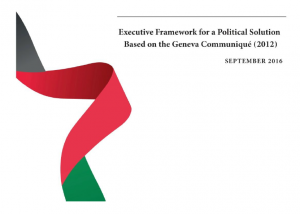P R E S S R E L E A S E
Kurdish National Council in Syria – Geneva Office
20 September 2016
The “Executive Framework” will neither bring peace nor equality
On September 7, 2016, the High Negotiations Committee (HNC) released a document in London called “Executive Framework for a Political Solution”, representing its draft for a transitional period in Syria. Starting yesterday, September 19, a delegation of the HNC campaigns for this paper at the 71st Session of the UN General Assembly in New York without taking into account the reservations submitted by the Kurdish National Council in Syria (KNC).
The KNC states clearly that this document is not part of a solution, but rather a danger to a democratic, pluralistic and unified Syria guaranteeing cultural, social and political rights to all its ethnic, religious and linguistic groups.
Whoever reads the document notes immediately that point 1 of the “General Principles” exclusively lists the Arab culture and Islam as sources “for intellectual production and social relations”. This definition clearly excludes other cultures – be they ethnic, linguistic or religious – and sets the majority culture as the leading one.
As Syrian Kurds we feel repulsed by this narrow perception of the Syrian people. The similarities between this definition and the chauvinist policies under the Assad regime are undeniable.
The KNC demands the recognition and the support of cultural diversity in Syria through a visible acknowledgement of all components of the Syrian people and by protecting their equal rights.
Consequently, the KNC disagrees that the “Executive Framework” sets Arabic as the official language without conceding that other languages like Kurdish or Aramaic can be declared second official languages in certain regions where they are spoken by large parts of the population.
Moreover, and although most Syrians are Muslims as the document states, there are also followers of other religions, for example Christians and Yezidi, and non-believers. This is one of the reasons why the KNC strongly advises to add secularism to the principles of the ruling system (point 4, General Principles).
Furthermore, the KNC appreciates that the provisions in points 5 to 7 of the General Principles try to attribute cultural and religious rights to all components of the Syrian people as well as ethnic and linguistic rights to the Kurds. Yet, none of those points explicitly mentions political rights or defines other components in addition to Kurds. The attribution of equal political rights to all Syrians is indispensable for our future.
Last but not least, everybody should be fully aware that the the suggested system of administrative decentralisation (point 8, General Principles) as well as the provision of a two-third majority vote in case of no consensus (point 11, General Principles) will not lead to the protection of minorities but rather to the domination of the Arab majority in Syria. Other Syrians will not have the chance to substantially influence politics.
Only a form of decentralisation that allocates decision-making authorities to different levels (e.g. local, regional, national), like federal structures do, combined with a strong notion of democracy can provide for a meaningful participation of all parts of the Syrian people. This has been shown clearly in numerous conflict-resolution processes.
Additionally, the KNC considers it necessary that the principle of consensus cannot be suspended when questions affecting minority groups as minority groups are discussed. The current formulations allow for a centralised authoritarian rule of the majority over minority groups. As a result, this document can neither facilitate (social) peace nor democracy.
Due to the aforementioned reservations the Kurdish National Council cannot consider the discussed document as binding. The KNC calls upon the international community to take a stand for ethnic, religious and linguistic diversity, equality, political decentralisation and democracy as essential parts of any agreement structuring the transitional period and the future of Syria.
If the international community would allow the potential exclusion of the Syrian Kurds from political participation in their country – an option in no way ruled out by the HNC’s “Executive Framework” – the Kurdish people would not only face hard times, but may have to take critical decisions regarding their future.

